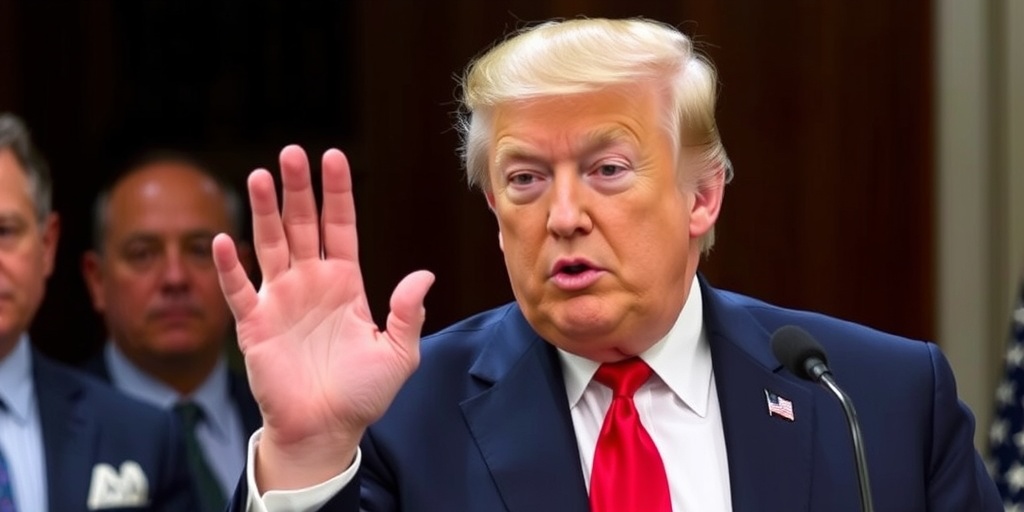Now Reading: Bessent Dominates Amid Trade Wars Impacting U.S. Economy
-
01
Bessent Dominates Amid Trade Wars Impacting U.S. Economy
Bessent Dominates Amid Trade Wars Impacting U.S. Economy

Former Treasury Secretaries Gather to Discuss Troubling Economic Climate Under Trump
In an unusual twist, the annual gathering of former U.S. Treasury secretaries turned somber this month, coinciding with President Trump’s so-called “Liberation Day.” Typically a convivial event aimed at welcoming the newest Treasury secretary into the fold, this year’s dinner, organized by former Treasury Secretary Steven T. Mnuchin, reflected the gravity of the current economic situation facing the United States.
The meeting brought together several prominent figures, including Robert E. Rubin, Henry M. Paulson, Lawrence H. Summers, Timothy F. Geithner, and Jack Lew, all of whom were present to share their insights and experiences. The absence of Janet L. Yellen, who was traveling in Australia, was noted by a spokesman.
The mood at the dinner was reportedly heavy, as attendees grappled with the fallout from President Trump’s aggressive trade policies, particularly the extensive tariffs imposed on multiple countries, including key allies. Scott Bessent, the current Treasury Secretary, found himself in the hot seat as he defended these policies — a defense that some of his predecessors viewed as a significant misstep for the U.S. economy. W. Michael Blumenthal, the former Treasury Secretary during the Carter administration, remarked, “The mood was somber,” highlighting the tension in the room as Bessent faced pointed questions regarding his justification for the tariffs.
Reports indicate that Bessent’s attempts to explain the administration’s trade strategies occasionally escalated into heated exchanges, with him raising his voice as he countered the criticisms directed at the administration’s economic policies. Blumenthal recounted that Bessent did not merely smile through the queries but seriously defended the administration’s position, reflecting the challenging dynamics he faces in his role.
The dinner conversation mirrored broader concerns among economists and financial experts about the impending trade war with China, which has raised alarms regarding potential inflation and a global recession. Many analysts assert that, despite inheriting a robust economy at the start of Trump’s administration in January, the administration’s current approach could be viewed as a self-inflicted economic wound. David Autor, an economist from MIT, characterized it as “one of the largest own-goals in diplomacy and economics” in recent history.
Bessent’s own prior reservations about tariffs have become more complex since his appointment. Previously, as a hedge fund manager at Key Square Group, he expressed skepticism about the efficacy of tariffs, arguing they would be inflationary and counterproductive for American industry. However, in his role as Treasury Secretary, he has publicly adopted a pro-tariff stance, asserting that such measures would merely cause a “one-time price adjustment” rather than long-term inflation.
The situation escalated further when Beijing retaliated against U.S. tariffs by imposing higher levies on American products. In a controversial response, Bessent downplayed the impact of these retaliatory tariffs, stating dismissively, “So what?” He maintained that the U.S. held an advantageous position due to China’s dependence on exports to America. This response prompted stakeholders to reassess their outlook on the economic stability of the market.
As market volatility increased, Bessent’s remarks on the economy further fueled concerns. He suggested that individuals nearing retirement were likely unaffected by the market’s fluctuations, stating, “I think they don’t look at the day-to-day fluctuations of what’s happening.” His comments led to criticism from the Democratic National Committee, which highlighted the ongoing challenges faced by everyday Americans as the stock market experienced significant declines.
Amid these developments, influential Republican figures, including Senator Ted Cruz from Texas, have begun expressing skepticism about the tariff policies. Cruz warned on his podcast that tariffs function as taxes on consumers, predicting devastating effects on American jobs and the broader economy.
Despite the tumult, Bessent has made some strides in moderating Trump’s more aggressive measures. Recent interactions with Trump led to a temporary suspension of reciprocal tariffs on multiple nations while opening channels for trade discussions. Nevertheless, the ongoing tension with China suggests that Bessent will continue to face pressure from hardliner advisers within the administration who advocate for a tougher approach.
Former colleagues of Bessent emphasize his expertise in markets and the need for him to ease investor concerns during this period of economic instability. However, skepticism remains, as several observers question his effectiveness in curbing the administration’s aggressive tariff policies. Analysts reiterate that while Bessent is a senior economic official, ultimate decision-making authority lies with President Trump.
As encouraging and historical perspectives were shared during the dinner, it became evident that former Treasury secretaries engaged in a significant dialogue about the gravitas of the current economic and political landscape. With past examples of Treasury secretaries who stood firm against political pressures, Blumenthal expressed concern, noting that Bessent’s tenure is complicated by circumstances where the needs of the country may conflict with the president’s directives.
As the meeting concluded, the weight of the discussions played out against a backdrop of a continuously evolving economic reality for the United States. The extraordinary nature of this gathering, focused on pressing policy issues rather than the usual lightheartedness, showcased the apprehension and uncertainty that former officials feel about the current administration’s approach to economic policy.
Stay Informed With the Latest & Most Important News
Previous Post
Next Post
-
 01New technology breakthrough has everyone talking right now
01New technology breakthrough has everyone talking right now -
 02Unbelievable life hack everyone needs to try today
02Unbelievable life hack everyone needs to try today -
 03Fascinating discovery found buried deep beneath the ocean
03Fascinating discovery found buried deep beneath the ocean -
 04Man invents genius device that solves everyday problems
04Man invents genius device that solves everyday problems -
 05Shocking discovery that changes what we know forever
05Shocking discovery that changes what we know forever -
 06Internet goes wild over celebrity’s unexpected fashion choice
06Internet goes wild over celebrity’s unexpected fashion choice -
 07Rare animal sighting stuns scientists and wildlife lovers
07Rare animal sighting stuns scientists and wildlife lovers





















